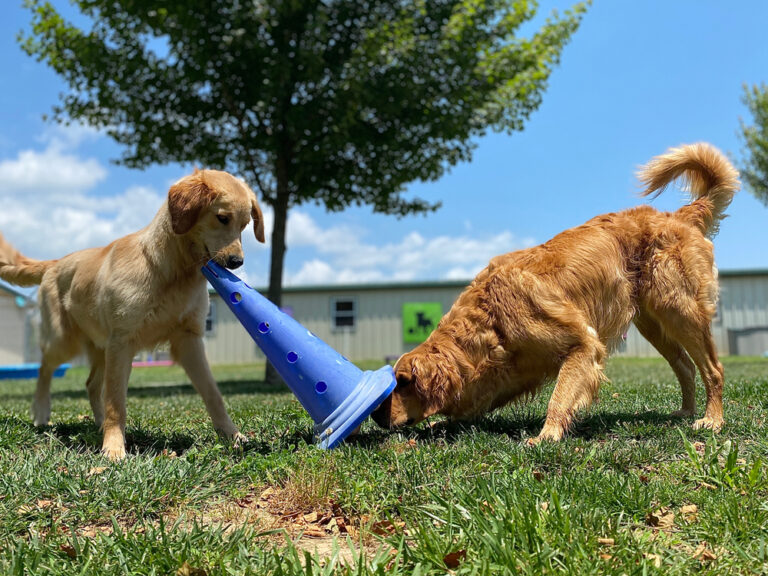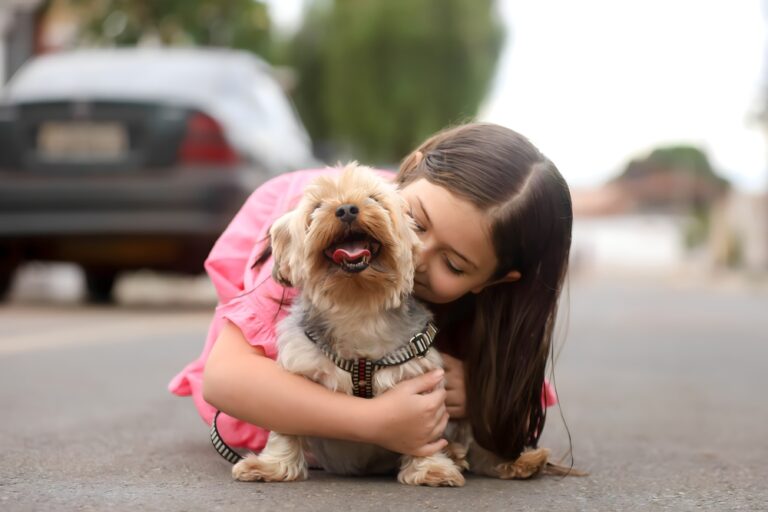The Bond Between Humans and Dogs
Dogs and humans have a special connection that has lasted for thousands of years. We often hear that dogs are “man’s best friend,” but what does that really mean? Why do we feel so close to dogs, and why do they seem to understand us so well? In this blog, we’ll explore the bond between humans and dogs, how it started, why it’s so strong, and how this relationship benefits both humans and dogs.
How the Bond Between Humans and Dogs Began
A long time ago, humans didn’t have dogs as pets. Instead, there were wild animals like wolves. So, how did we go from wild wolves to having dogs in our homes? It all started thousands of years ago when humans first began living in groups and needed help with hunting and protection.
Wolves were attracted to human camps because of leftover food. Over time, certain wolves became friendlier to humans, and humans realized these animals could help them. Eventually, the friendliest wolves became domesticated, which means they became more like pets. These early dogs helped humans hunt, protect their homes, and guard their families.
As time went on, humans and dogs started to depend on each other. Dogs became loyal companions, helping humans with important tasks, while humans provided dogs with food and shelter. Today, this partnership is still going strong, but now dogs are more than just helpers—they’re family members.

Why Dogs Are Called ‘Man’s Best Friend’
There’s a reason why people say dogs are “man’s best friend.” Dogs are incredibly loyal and loving. They don’t care if you’re having a bad day, they’ll still wag their tails and want to be by your side. They don’t judge you or ask for much in return—just love, attention, and some food!
Dogs are also great at sensing our emotions. If you’re sad, your dog might come sit by you to make you feel better. If you’re excited, your dog will get excited too! This emotional connection is one of the reasons why we feel so close to our dogs. They seem to understand us in ways that other animals don’t.
How Dogs Help Humans in Everyday Life
Dogs do more than just offer emotional support—they help people in their everyday lives. For example, service dogs are trained to help people with disabilities. Some dogs guide people who are blind, while others can sense when their owner is about to have a seizure and alert them. These dogs save lives by helping people stay safe.
Therapy dogs also play an important role. They visit hospitals, schools, and nursing homes to comfort people. When someone is feeling stressed, anxious, or lonely, just petting a therapy dog can help them feel better. These dogs bring happiness and peace to people in tough situations.

How Humans Show Love to Their Dogs
Dogs show their love by wagging their tails, licking your face, or just being near you. But how do humans show their love to dogs? There are lots of ways!
- Petting and playing: Most dogs love to be petted and played with. Whether it’s a game of fetch or just belly rubs, spending time with your dog shows them you care.
- Taking care of them: Feeding your dog, taking them for walks, and giving them a comfy place to sleep are all ways of showing love. Dogs rely on humans for their basic needs, and when we meet those needs, they trust and love us even more.
- Training and teaching: Dogs love learning new things! Teaching your dog commands like “sit,” “stay,” and “come” not only makes life easier but also strengthens your bond. Dogs love to make their owners happy, and training helps them understand how to do that.
Spending time with your dog every day is important for building a strong relationship. Dogs thrive on routine, so regular walks, playtime, and training sessions help them feel secure and loved.
How Dogs Understand Us
Dogs might not speak our language, but that doesn’t mean they don’t understand us. Dogs are amazing at picking up on human body language and emotions. They can sense when we’re happy, sad, or angry just by looking at our faces or listening to our tone of voice.
When you speak to your dog, they pay close attention to your voice. They don’t understand every word, but they can recognize certain ones, like “walk,” “treat,” or “play.” In fact, some dogs can learn to understand up to 100 different words!
Dogs also use body language to communicate with us. For example, when your dog wags their tail, they’re happy. If they tuck their tail between their legs, they might be scared or nervous. Learning to understand your dog’s body language can help you communicate better with them.

The Benefits of the Human-Dog Bond
The bond between humans and dogs isn’t just about emotions—it also has health benefits! Here are some ways that owning a dog can make you feel better:
- Mental Health: Dogs are great for reducing stress and anxiety. Just petting a dog can make you feel calmer and happier. People who spend time with dogs often feel less lonely and more connected.
- Physical Health: Owning a dog can help you stay active. Dogs need exercise, which means you’ll be walking or playing with them regularly. This helps keep both you and your dog healthy.
- Social Benefits: When you take your dog for a walk, you’re more likely to meet other people. Dogs are great icebreakers, and many people make friends with other dog owners.
Dogs bring joy, comfort, and companionship to their owners. They are always there for us, whether we’re having a good day or a bad day. This bond between humans and dogs benefits both species, making life better for everyone involved.
FAQs About Dogs and Humans Bonding
1. How do dogs understand humans?
Dogs understand humans mainly by reading our body language and listening to our tone of voice. They can also learn to recognize certain words, especially if we train them.
2. Can dogs sense our emotions?
Yes! Dogs are very good at sensing human emotions. They can tell when you’re happy, sad, or even angry, and they often change their behavior based on how you’re feeling.
3. How long have humans and dogs been bonding?
Humans and dogs have had a close relationship for over 15,000 years. This bond started when early humans domesticated wild wolves, and it has grown stronger over time.
4. What are service dogs?
Service dogs are specially trained dogs that help people with disabilities. For example, they can guide people who are blind or help people who have seizures.
5. How do dogs help with mental health?
Dogs can reduce feelings of stress, anxiety, and loneliness. Spending time with a dog releases feel-good hormones, which helps improve your mood and mental health.
Conclusion
The bond between humans and dogs is one of the most unique relationships in the world. Over thousands of years, this connection has grown from a simple partnership into something much deeper. Today, dogs are more than just pets—they are our friends, protectors, and companions.
Dogs make our lives better in so many ways. They help us feel happier, healthier, and more connected to the world around us. In return, we give them love, care, and a sense of belonging. This bond benefits both humans and dogs, and it will continue to grow stronger for generations to come




